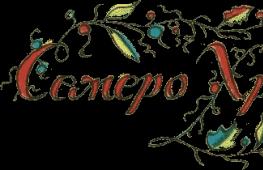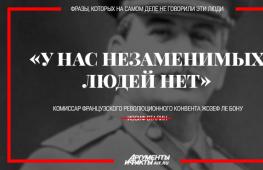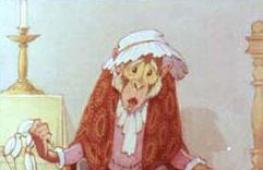School 8 type sample characteristics for a graduate. Ready-made examples (samples) of characteristics for secondary school students
per student (s) of class SCS No.
District, St. Petersburg
Name of student date of birth
F. I. lives at the address: St. Petersburg, .... He is studying at ... since 09/01/2005. He is studying according to the auxiliary program of the VIII type (variant I), grade 5. F.I. does not master the 3rd grade program. Cognitive processes are formed at an extremely low level. Determined qualitatively low level development of the abilities of verbal and intuitive-practical thinking. There is passivity and stereotyping of mental activity, a visual-effective type of thinking prevails, unformedness is revealed. mental operations(analysis, synthesis, comparison, generalization, classification, abstraction). The memory is mechanical, short-term, the amount of memory is significantly reduced. The learning process is unproductive and non-dynamic.
FI is very difficult to concentrate on the lesson, the attention is extremely unstable, easily distracted, the concentration of attention is low, the amount of attention is significantly reduced. There is a violation of spatial and constructive praxis: he is very poorly oriented in the scheme own body, the orientation in the scheme of the opposite body is not formed, it is very poorly oriented in space and on a sheet of paper. Spatial-temporal representations are not formed. There are violations of general and fine motor skills. Graphomotor skills are poorly developed. There is a pronounced motor awkwardness, clumsy demeanor, slowness. Stereotypes in behavior in the form of rocking, monotonous head turns, bouncing, tiptoeing, thumb sucking. The level of social knowledge and ideas about the world around is defined as extremely low.
Vocabulary is poor. Expressive speech is presented at an extremely low level of development. Gross underdevelopment of phonetic phonemic processes. The rate of speech is weakened, arrhythmia. There is incoherence in speech, inability to dialogue. The voice is quiet. Speech is monotonous, sluggish, inexpressive. Speech contact is difficult. Understanding of addressed speech is limited and requires the teacher to provide simplified instructions, specific questions, and repeated repetition. Skills of inflection and word formation are not developed. Rough and persistent agrammatisms are observed in oral and written speech. Connected speech is at a very low level of development.
FI shows little interest in learning. There is no school motivation. In class, he does other things. Often gets up from his seat, crawls under desks, can hit for no reason, often pinches and bites. The girl does not respond to comments.
Game activity is formed insufficiently. Can't play on its own. Loses interest in the game quickly.
Cultural and hygienic skills are not developed. Self-service skills in the formation stage.
The emotional-volitional sphere is disturbed, often uncontrollable, emotional lability is observed (begins to cry, then laughs out loud, talks loudly with imaginary people). Cannot perform the most elementary tasks independently. Any minimal interference knocks her out of the training mood. FI does not have deep inner emotional contacts with surrounding children and adults. He is not friends with any of the children, there is no attachment to anyone. Likes to be alone.
Difficulties encountered in learning educational material are associated with a very low level of development of cognitive functions. FI is constantly in need of stimulation.
Knowledge, skills and abilities in the following subjects have not been mastered:
Mathematics.
Not accepted: size, mass, dimensions, words denoting them; the position of objects in space and on a plane relative to themselves and to each other; parts of the day, their order; days: yesterday, today, tomorrow; composition of numbers 2, 3, 4, 5 from two terms.
Didn't learn: compare objects by size, size, mass "by eye", overlay, application; evaluate and compare the number of items in the aggregate “by eye”, by establishing a one-to-one correspondence, highlight the excess, the missing; increase and decrease the number of items in the aggregate; determine the position of objects in space relative to themselves; establish and name the order of objects; classify geometric shapes; determine the shape of familiar objects; find out the number of two or three items without recalculation, perform addition and subtraction of numbers within 5; solve elementary problems on finding the amount and balance, performing independently practical actions.
Reading and writing:
Not accepted: the name of some objects of their immediate environment; names of the seasons, months, days of the week; names of many objects, phenomena, actions, signs of objects in many lexical topics. There is dysgraphia and dyslexia.
Didn't learn: write from dictation; make simple sentences on a simple situational picture; correctly pronounce sonorous, whistling sounds and affricates; highlight the first and last sound in a word, hear the given sound; use a notebook, hold a pen correctly, master the simplest ornamental drawing in a notebook, independently observe the lines, the interval between graphic images in a line, correlate printed letters with written. The syllable is difficult.
FI cannot be trained in class conditions. It is necessary to continue individual home-based training.
Deputy Director for SD.
Graduate characteristic
Pupil of 9th grade GBOU Yanaul special (correctional) boarding school1111 types
Belosludtsev Alexander Igorevich, born on September 11, 1999.
Belosludtsev Alexander entered this school at 111. The family in which the teenager is brought up is not a roll, there is also a younger sister.
program material remedial school assimilates, studies well. And the stock of knowledge and practical skills is limited to the familiar household sphere. With a margin limited to everyday topics. In Russian, he performs grammatical tasks independently, dysgraphic errors are observed when writing from dictation. Reading in whole words, meaningful. The content of the read with distortions. In mathematics, on a specific counting material, it performs arithmetic operations. Tasks are solved with the help of a teacher after a detailed analysis.
At the lessons of trade education, he is engaged in a carpentry workshop. During the period of study, he mastered the necessary minimum of knowledge, skills and abilities in the studied profile. P operations can perform independently. Practical work Alexander tries to do it carefully.
By nature, Sasha is a kind, sociable young man. Active participant in class life. Maintains ethical distance in relationships with adults. Relationships with peers are smooth and friendly. Responds appropriately to comments.
Owns self-service skills, for his appearance is watching.
School Director N.T.Khafizova
Graduate characteristic
Pupil of grade 9b GBOU Yanaul special (correctional) boarding school of the 8th type
Arslanov Ilsur Valerievich, born on January 28, 1999.
Arslanov Ilsur entered this school in 2013 in the 8th grade. Ilsur's parents are deprived of parental rights.
The program material of the correctional school assimilates in in full. Educational motivation is formed. The current stock of knowledge and practical skills corresponds to the acquired knowledge of the program. Cognitive activity is average, he is active in the classroom, easily switches from one type of activity to another. Vocabulary is sufficient. Able to listen, ask complementary and clarifying questions.
In Russian, she writes dictations on her own, with minor errors. Grammar tasks are performed with the partial help of the teacher. Reads correctly, consciously, fluently. Retells close to the text, answers questions on the content of what has been read. Easily and quickly memorize poems. In mathematics, counts, compares and writes numbers within 1000000 in direct and reverse order, performs oral and written operations of addition and subtraction in the named limit. Knows how to use the multiplication table. Understands the meaning of tasks and solves them independently. He has sufficient knowledge of geometric knowledge (construction of segments, work with geometric shapes).
On labor training masters beekeeping business. In the process of performing work, the young man tries to perform actions carefully. The program material assimilates, is guided in the task, knows how to plan work. Interested in results of work.
Ilsur sings well, goes in for sports. Participates in class and community activities. Repeatedly was a member of the school team to participate in the Republican cultural and sports festival, Special Olympics for students of special (correctional) boarding schools of the 8th type, where he won prizes in the team event.
By nature, Ilsur is a friendly, sociable, open young man. He maintains an even relationship with his classmates, enjoys trust and respect. Maintains ethical distance in relationships with adults. Responds appropriately to comments.
Self-service skills are formed. Looks after appearance. Knows how and loves to work. Oriented in society.
School Director N.T.Khafizova
Class teacher I.V. Akhmetgareeva
\ Documentation \ For class teacherWhen using materials from this site - and placement of the banner is MANDATORY!!!
Sent a description of a student: Lukhtanova Victoria, teacher of labor education, classroom teacher in the 9th grade, boarding school of the VIII type
Psychological and pedagogical characteristics per student Grade 9 KGSOU
"__________ special (correctional)
general education boarding school of the VIII type"
Victor, 22. 11. 1992
Vitya entered school at the age of 9, in 2001. Previously studied at ____________ primary school. They live with their stepfather, who does not work anywhere, the family is low-income, with many children, all adult members of the family smoke, including in the house, with young children.
The physical development of a teenager is average, he suffers from a stomach ulcer, which worsens in autumn and spring, and often suffers from colds. Vitya has a low level of motor development, his movements are not well coordinated.
The teenager is not focused on cognitive activity, he does poorly in subjects. The level of education is low. There are violations of attention, a low level of concentration, distribution. At the lessons he is distracted by external stimuli. Vitya's reading and writing disorders are due to systemic speech disorders. When performing training tasks, he is unable to switch from one type of activity to another, cannot plan his activity, correct an error if it is indicated. It takes time to work out. Victor reads monotonously, syllable by syllable and slowly, skips letters and syllables, reads incorrect endings. Doesn't teach poetry. Due to errors, the read text does not always fully understand, retells independently. Logical thinking poorly developed, cannot draw elementary conclusions, solve examples of logical orientation. Vocabulary is small.
He makes notes in notebooks carelessly, carelessly, writes with many errors. Poor skill in working with tools. In mathematics, computational operations are performed slowly, with a large number of errors, and do not always understand the meaning of the task. In educational activities, a teenager needs organizing, planning assistance and approval at all stages of the lesson.
Previously labor training due to health reasons, he passed the profile "service work", now he is studying the profile "plastering - painting", his attitude to this profile is neutral. When mastering technical and technological knowledge, he needs the help of a teacher. He does not orient himself in tasks, needs additional explanations from the teacher, does not own error analysis and self-control, does not perform markup, and makes a report on the work done under the guidance of the teacher. Victor has no skills in working with tools. When performing labor operations, he quickly gets tired, is not capable of strong-willed effort. The teenager does not apply previously learned knowledge in his work. Difficulties are overcome only with the help of a teacher.
Vitya is emotionally unbalanced. In difficult situations, impulsiveness and aggressiveness are possible, which are protective in nature. Active in communication with peers, but relationships are superficial. Prefers play activities, emotionally immature. Not prone to conflicts, good-natured, ready to help a friend. Self-esteem is adequate, tries to comply with accepted rules and norms. Able to control his emotions. Vitya has not developed sanitary and hygienic skills, the teenager is dirty, untidy, does not take care of himself and is indifferent to his appearance. We need constant monitoring of appearance, cleanliness of clothes, hands, hair.
Characteristics for a student / student issued for presentation at ___________
15.09. 2008
Head teacher ______________________
Classroom teacher _________________
Reduced characteristic per student is exemplary. Naturally, each student is individual and it is impossible to develop an absolutely universal template. psychological and pedagogical characteristics per student
Psychological and pedagogical characteristics for a student of a correctional school.
Liked? Please thank us! It's free for you, and for us - great help! Add our site to your social network:Characteristic
student of the VIII b class of the Kuva special (correctional)
secondary school– VIII type boarding school
Ivanov Denis Ivanovich born on 12.10.95,
living at the address: Kudymkar, st. Dorozhnikov 15-2
Parents:
Mother: Ivanova Natalya Sergeevna
The boy is raised by his mother.
Denis has been studying at this school for eight years, in a class for children with severe intellectual disabilities. Health group V. Physical culture group special. Disabled child. According to the medical card, vision, hearing, and sense of smell are normal.
There are no absenteeisms for unexcused reasons.
The main actions of educational activity are formed. Average learning ability. Interested in learning. The memory is figurative, attention is relatively stable, it is easily included in the work, it is difficult to switch from one type of activity to another. Capable of goal-directed activity.
He has little contact with peers, prefers to communicate with high school students. He treats adults with respect, reacts calmly to comments, tries to improve. The general motivation is social, based on the understanding of the social need for learning. Educational and cognitive motivation is developed, worries about their failures. Motor functions are formed (steady gait, coordination of movements is not disturbed). Fine motor skills are moderately developed, the leading hand is left. Motor skills associated with self-service are well developed.
Developed ideas about the environment. Learning activities on the Middle level. Denis knows information about himself, understands family ties. Knows home address, phone number. Spatial orientation skills are formed.
Visual-figurative thinking prevails.
Cognitive interests are formed. Denis accepts Active participation during the lesson. The overall pace of activity is average. The situation of success causes positive emotions. The ability to volitional effort is somewhat reduced, tk. Sometimes he doesn't finish what he started.
The presence of a poor and poorly differentiated vocabulary, which is activated with difficulty, is noted. Denis knows general concepts like furniture, birds, etc., knows the sequence of the seasons, the order of the days of the week.
The passive vocabulary prevails over the active one.
During the training, the following knowledge was revealed:
Reading: Reads by syllables. When reading, distorts words, replaces endings. He understands the meaning of what he read. He expresses his impressions on the text he has read. Works well for selective reading. Poems are hard to memorize. V free time loves to read.
Letter: Writes in a notebook written letters, observes the line, sees the boundaries of sentences. Writes off almost without errors from written, as well as from printed text. He writes with errors from dictation, because he slowly masters the sound-letter analytical skills of literate writing. He knows the rules he has learned and tries to apply them in his work.
Counting: Counts up to 100. Freely performs operations up to 100. Familiar with multiplication and division. Solve simple problems independently.
Labor: Hardworking, willingly fulfills all the tasks and assignments of the teacher.
He attends speech therapy lessons without desire. He was convinced that he knew everything and was able to do everything. There is a lack of formation of phonemic processes, and the skills of sound-letter analysis and synthesis. There are difficulties in determining the number and sequence of sounds. Does not hold full syllabic structure polysyllabic words, especially those with a confluence of consonants.
Self-service skills. The group behaves calmly. Under the influence of others. Secretive, does not like to talk much. He is silent on comments. Fulfills the teacher's requirements.



